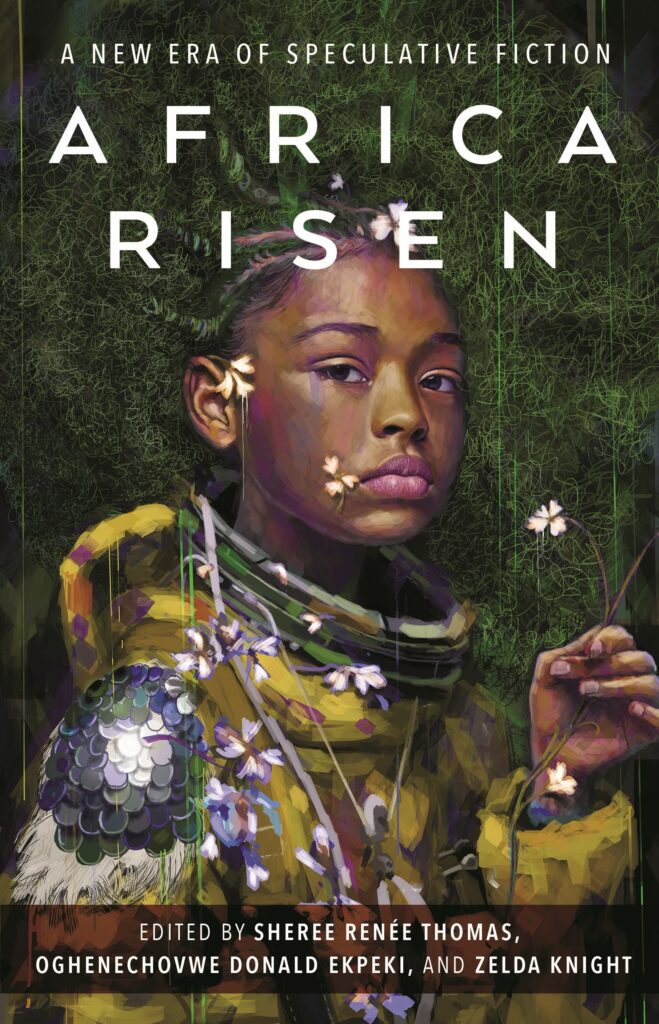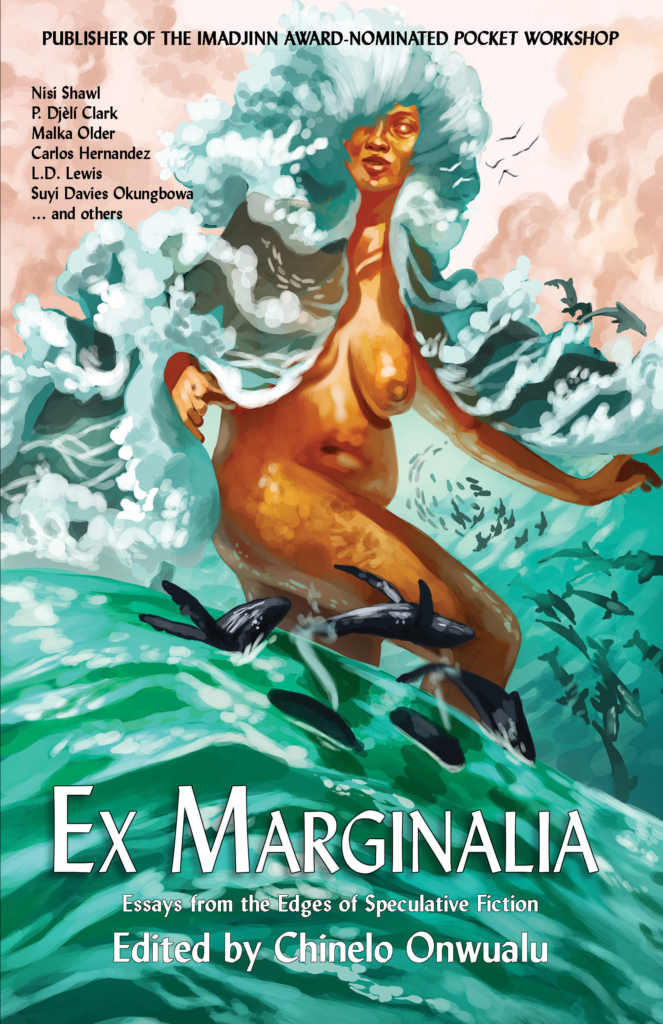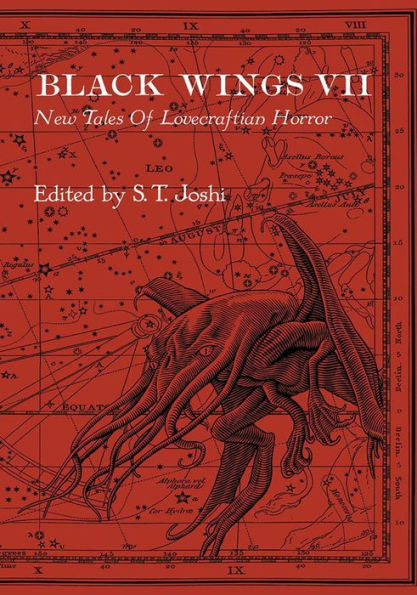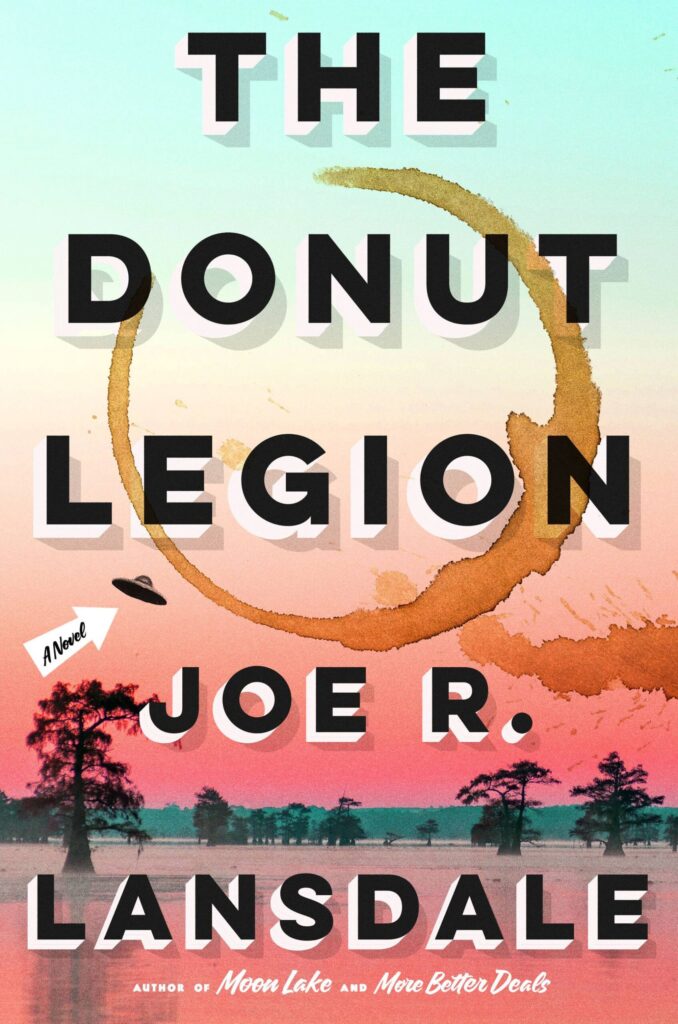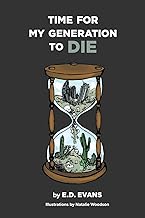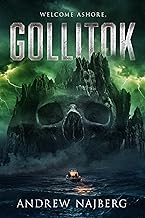Issue #114: WE’LL GATHER AT RUAPEHU
Publisher’s note: This is Part 1 of my “Star Trek: Next Generation” novel, WE’LL GATHER AT RUAPEHU.
Introduction
In 2001, Westview Press published a book written by Ross S. Kraemer, William Cassidy and Susan L. Schwartz called “Religions of Star Trek.”
I was captivated by that title. I have always thought that what made “Star Trek” in all its incarnations so popular, and what separated it so distinctly from so much televised, derivative pablum, was its – yes – sense of spirituality.
Think of all its best episodes. From the original series, “Bread and Circuses” to the “Inner Light” episode from “Star Trek: The Next Generation” (I would include “Who Watches the Watchers?” from that series as well), viewers have come to expect, and have received a lot more,
than the standard buttons and tropes of science fiction. There was always something transcendent about the best of “Star Trek.” It took us to another realm, out of our known space, to places we had never seen or experienced before. It continues to border on something spiritual, even religious, for a lot of fans.
Why? It promised a future that was better than the one we are in now. It promised that technology will deliver us from the evils of disease, wars and natural disasters.
And I wondered: no episode really tackled the nature of religious belief head-on. I spent many a dream-filled night thinking about that, early on, while producers were developing “The Next Generation.”
(Even some of the original soundtrack of “Star Trek: The Original Series” has a poetry, grandeur and spirituality that ensures it may well live forever in the hearts of fans.)
There is an interesting history to “We’ll Gather at Ruapehu.”
The story precis dates back to 1983, before I submitted it to the producers of “Star Trek: The Next Generation.” It wasn’t until September 1988 that I pitched the idea, through my agent, Jim Clymer, Lancaster, Pa. to Maurice Hurley of Paramount Studios. Late in September 1988, I received a call from creative consultant (then) and soon-to-be story editor Tracy Torme (singer Mel Torme’s son and, eventually, executive producer of TV’s “Sliders”) about visiting with Paramount and possibly serving as a creative consultant.
My story precis was rejected officially by Paramount on March 13, 1989. I have the original rejection letter by Melinda Snodgrass, script editor at the time.
However, Tracy called me and liked the fact that I had something going with the story and was a lifelong fan of Trek. Tracy asked if I could work with them, if I visited Los Angeles.
Amazing, huh? No, I am not making this up: I could have been a contributing writer to “Star Trek: The Next Generation” if only the circumstances were better. Which they weren’t. But that’s another story.
***
“We’ll Gather At Ruapehu” is set approximately six earth-months after the final Next Generation episode,
“All Good Things” (Stardate 47988.1) By the way, one year is 917.35 stardates. A half year is 458.67.
Just for the record, the “Star Trek: Generations” movie is Stardate 48632.4.
“We’ll Gather at Ruapehu” had its origins in many episodes. Frankly, there is something even spiritual about the episode of Next Generation’s “Dark Page,” production number 259, which aired on Nov. 3, 1993, or Stardate 47254.1.
I was even inspired by the scene where Data stops the Borg- Captain Picard by arresting Captain Picard- Locutus’s arm, breaking off Locutus’ artificial appendage, as Data penetrates the Borg Collective on “The Best of Both Worlds: Part 2.”
The many, many scenes where Data tries to educate others about his status as an android, to little effect, infused the dialog between him and Kesha, Alhamisi Uhura and Benefactor Ali Onyango in my novel.
The scene in this novel where Data appears to sport is original to the “Star Trek” universe.
***
How did “We’ll Gather at Ruapehu” eventually arrive as a novel?
Disgusted with the lousy “Star Trek” films and discouraged since “Star Trek” ended its TV appearances in
2005, I rented some “Next Generation” DVDs from the library while this was being written. I really missed the show. I also streamed CBS for many of those episodes and rewatched all of them, mesmerized by how good they were.
So in writing this, it was great to create an episode I’d never seen.
It took some time to write my own ST:TNG script from its beginning on Oct. 13, 2012 until its completion on March 8, 2018. So it came to fruition in less than six years. I finished the plot outline on Father’s Day, June 15, 2014. But it took about another four years to complete.
What an ordeal.
But I think it is a beauty and I am proud of “Ruapehu.”
***
If this is ever made into a movie, here is my preferable cast of characters and the actors who could easily portray them:
CAST
Bright One, also known as Honore: Sting
His Eminence Alhamisi Uhura: James Earl Jones
Captain Nyota Uhura: Nichelle Nichols
Benefactor Ali Onyango: Ben Kingsley
Isaac Asimov: Paul Giamatti
Kesha: T.J. McGibbon A’isha: Carolina Bartczak
Kemal ibn Ishaq: Tom Mison
Benefactor Morsi Gomaa: Rufus Sewell
Chaba Fetama: Cornell John
The rest of the cast (of course): Captain Jean-Luc Picard: Sir Patrick Stewart
Machine-Man, or Lieutenant Commander Data: Brent Spiner Commander William T. Riker: Jonathan Frakes
Chief Engineer Geordi La Forge: LeVar Burton
Lt. Commander Worf: Michael Dorn Guinan: Whoopi Goldberg
Counselor Deanna Troi: Marina Sirtis Chief Medical Officer Beverly Crusher: Gates McFadden
Lieutenant Reginald Endicott Barclay III: Dwight Schultz
***
I hope you enjoy “We’ll Gather At
Ruapehu.” The story of Data and the artificial world of Ruapehu were inspired by this poem:
I died as mineral and became a plant,
I died as plant and rose to animal. I died as animal and I was human. Why should I fear? When was I less by dying?
Yet once more I shall die human, To soar with angels blessed above. And when I sacrifice my angel soul I shall become what no mind ever conceived.
– “A Stone I Died” Mewlana Jalaluddin Rumi Persian Poet (1207-1273)
***
Chapter 1
The Enterprise Holodeck
The sound of a roaring crowd in the Old Earth football stadium became almost painful to the Klingon’s ears.
“Reggie!” shouted the crowds. “Kill him!”
“Break his legs!”
So this is a football stadium, Worf thought, looking around the image on the holodeck created by
Commander Riker. The commander thought I would enjoy this. Even Worf was taken by the concrete-and- steel stadium’s primitive late 20th Century Earth architecture, which reflected an earlier, barbaric period in the planet’s history.
Worf was aware of the many “fanatics,” some waving signs above their heads with the full-Earth sun glinting off them like Star Batleths launched from a Plomeek field. The signs read, in Old English, “Minister of Defense.” Worf thought, Minister? Is football some kind of human religion?
The number on the back of Worf’s shirt, what they called a “jersey,” was inscribed with the number “92” and the name, “White.” Why do they call it a “Jersey”? Worf pulled the primitive cloth away from his chest. What is the significance of Number
92? Intriguing, Worf thought. Who — or what — was ‘White’?
The so-called football “enemy,” Worf thought, stood in front of him at Veterans Stadium, the name of the playing field and of the holodeck program. The colors were a metallic blue and gray with a big blue star. The Dallas, Texas, Old Earth Cowboys’ holographic program quarterback picked himself up off what the originators of the stadium called “artificial turfgrass” (why not real grass like en’chula, blue and vibrant? Worf wondered). The Klingon lieutenant shook his head in disgust, thinking human games left much to be desired.
Reggie/Worf went into his stance, eyeing a blocker in front of him. “I’m going to take you out,” the player told Worf.
“To where?” Worf/Reggie responded.
In a few seconds, the Klingon easily thwarted the block, knocking the player to the ground and tackling the man with the football. Worf drove the player’s head into the artificial turfgrass.
“Hey Reggie, don’t be an asshole. You don’t have to kill me,” said the human wearing the “star” symbol on his helmet with Number 8 emblazoned on his jersey. The human’s name was on the back of his shirt – His jersey, Worf corrected his thinking: Aikman. Like the Klingon Aug-mahn, “pale carrier.” Worf thought. Why is the human team leader named “pale carrier?”
The fanatics on the holodeck program that Geordi and Commander Riker created for him reacted wildly,
violently, as Worf growled at the weak and embarrassed “quarterback- leader.” The Klingon said to the pale- carrier, “Next time, Quarterback- leader, it may hurt more.”
Reggie/Worf knew he was part of the “pass rush” defense installed by Commander Riker (wait, Worf thought, I have to remember his correct title. In this era Commander Riker is identified as Coach Jeff Fisher). Fisher/Riker was listening to audio transmissions on his headset on the “sidelines” and gesturing wildly to Worf. What does Commander – Worf shrugged, annoyed at his dishonorable forgetfulness, Coach Fisher, I mean
– want now? Then he saw Fisher/Riker pointing to another player on Worf’s “team” who shouted to all of them. “Set clay-3-4, go, Jaw! 3-4 Jaw!”
Worf shook his head. Ah . . . a message. Some kind of attack code. But what does the code mean? The player shouting the “code” was named “Seth.” Seth, Worf smiled. A nickname. From sethchazthen, no doubt. The name signifies “out of adversity, staunch dignity.”
“No stopping us, Reggie, we bringing it to you man,” said the offensive player, a “guard” Reggie came to know as Newton, wearing number 61.
Growling, Worf was ready for the next “play” and stared down at the human guarding Number 8. The “center” player, if Worf remembered correctly, would move the ball underneath his legs, quickly, to the quarterback, the enemy’s leader. Must prevent the ball from getting into the enemy’s hands, Worf
remembered Coach Fisher telling him.
But the players are protecting the ball as if their lives depended on it, Worf told him.
The odd-shaped ball was snapped. Worf pushed the player aside, crashing into the quarterback, throwing all of the Klingon’s weight into the pale-carrier’s shoulder, jarring the ball loose. A swarm of his “team” at once tried to grab for the football and one escaped a pile of players, all shouting human profanities along with the word “sack.” The stadium erupted and the fanatics flew to their feet, shouting “Reggie! Reggie! Reggie!” All eyes were on Worf as he picked himself up from the turf and smiled.
Worf spun around and, looking at his smiling commander and coach,
raised his arms high to fans of “White” high in the stadium, and at the top of his voice shouted to the thousands, “I . . . love . . . this . . . game!”
***
Chapter 2 The String
This is not a dream, Kesha thought, but instead a vision. It has
to be a String, as written by the prophets.
The Span was vibrating violently. The Ground We Live On, the Ringworld of Ruapehu, was shaking violently, dangerously. What was Kesha to do? Where was she to go?
Kesha knew that the Outworlders, those from beyond the Ring, would refer to her as a “freak,” a Puppeteer. The aliens are monolithic creatures, those of the strange Starship, one culture, combined into many, into nothing. Kesha thought, On Ground We Live On, Ruapehu, our world, we are diverse, many, and special. We are the Founders’ children. We carry on our work. It is the Founders’ legacy.
In the String, Kesha was tending to the Community Prudence Plant using the zhellar, her precious stone
hand piece that glittered in the light, picking off the old lavender and white flowers. The zhellar was handed down to her from her late uncle, Laramee Michoud, keeper of the prudence plant at the capitol of the ringworld, Ahmadiyya Prime. The plant itself was very pretty; it vibrated and drooped, drooped and vibrated again, some say because of mysterious atmospheric waves, others because it was a living entity that helped direct the panel interstices or the moments of time between darkness and sun, times of rest before the sun appeared brilliantly again, above so high. Prudence, as it translated in her language, meant “sentinel.”
Sentinel. Like a soldier, watching over us. That would imply an enemy. Who are the enemies of Ruapehu? Who would be angry at us, despise us? Why would anyone harm Ground
We Live On? We are all friends. We are all peaceful inhabitants. We are millions and millions, friends, all of us. We have no enemies.
But this wasn’t a waking dream, such as she had sometimes when she played with her friend Beneira, which occurs in the time between the interstices and the panels that blocked the sun, creating their time of rest. This was direct, solid, apart from wishful wanderings. This seemed strikingly clear and real.
Not a dream. Reality. A dream so strong it feels real: a String.
In the short life of the String, Kesha could feel the Span shaking violently, and buildings were falling down all about her. Ruapehu’s end is the beginning of the New Time, the times selected by the Founders.
She heard the cacophony of the injured and dying Puppeteers. The Ground We Live On shook with an intensity much like her teasing schoolmates, trying to get her to fall off the limbs of a shuttered Prudence Plant Tree, frighteningly real, dangerously true, scaring her so she would move in toward the trunk. There are the screams and terror of the dying, she thought. In the String she witnessed, there was the alien and green-skinned human, an alien the Outworlders called “Data,” which translated as kaituao, or Machine-Man, and another, called Bright One, standing next to each other, wrestling with each other, and then vanishing. Why did they fight? To where did they disappear?
Kesha remembered stories she heard, myths from her classroom
about the Bright One. He was a Founder, one of the ringworld engineers. A fashioner. A sentinel? And who was the Ringworld’s Founder Prime? The Bright One I saw with kaituao, the Machine- Man, is he Founder Prime?
Kesha recalled the myths of the last days, written by the Founders, when the world would be on the brink of destruction, and their foreseen battles with the intruders. Were the kaituao Machine-Man and his Federation beings the enemies of the ringworld? But the story – and their fate – was unclear, not written by prophets, not revealed in a String.
But Bright One remains only a portion of the Book of Prophets, Kesha thought, and serves only as a way to fashion meaning toward the only true god, Allah. But the Bright
One, a prophet, would vanish into the air, to return to a rebuilt world, one made by the Engineers with Allah’s directions, with his hand. So Kesha was taught.
The thoughts were troubling. If Ruapehu were ever in danger, where would the Puppeteers go? Where could they go?
And why the alien “Machine- Man”? Why was he fighting the Bright One? Too many questions, Kesha thought. My head aches. Kesha didn’t want to think anything more about it. She wanted to be with her family again and play with Morta, her pet Haleem.
She turned in her Hauku and slept came over her, but only after she contemplated the dream of the Machine-Man, and his battle with
Bright One, vanish from her inner eyelids.
***
“Captain’s Uhura’s Log, Stardate 48442.1. Science Vessel Ponce De Leon is en route to the Beta Quadrant and the coordinates of the neutron star anomaly interception location at a distance of four point seven parsecs from the Ringworld of Ruapehu. Our calculations place us exactly three hours ahead of the anomaly and its impending collision
with the Ringworld. The plan to deploy the CED is on schedule. Uhura out.”
Captain Nyota Uhura remembered her orders from Fleet Admiral Guan Youfei from the Starfleet officer’s long debriefing. No one must know about this mission to save billions of inhabitants. Starfleet feared ringworld-wide panic with potential loss of millions – even billions – of lives. And panic on a scale of billions would be a diplomatic catastrophe for Starfleet. Ruapehu was only a recent member of the Federation.
Still, Uhura felt uneasy. Of all her missions, this felt . . . uncertain, she thought. Something is not right. I can’t believe what we are facing. Deploy the CED and slightly alter the course of the neutron star, thus saving the ringworld. A simple mission. It seems far too simple.
But the catastrophic explosive device, made of the most concentrated inversive antimatter known to Starfleet, could fall into the hands of terrorists. There were Kardassians everywhere in the sector, waiting for an opportunity to disrupt Starfleet’s plans and blame human (or Klingon and Andorian) miscalculation. Her Starfleet science vessel’s mission was to remain top secret.
Uhura shrugged off the worry.
Nothing that a good tea couldn’t do to salve my worries. Uhura couldn’t manage a smile, no matter how hard she tried to dispel the worries, or how much tea she drank.
***
His movements were quick and
undetectable aboard the Ponce De Leon. The so-called CED. Must find it
and prevent them from doing harm to the Founders plan for Ground We Live On, the Intruder thought. His biosensors were registered to Acting Ensign Kai Falatka, who was serving on the United Starship LoFontaine but was transferred to the starship Ponce De Leon. Many were transferred on the emergency visit of the Starfleet vessel to stop the neutron star from twisting the ringworld up like . . . how do the humans say, a pretzel? At least Kai was out of harm’s way, still ensconced on the U.S.S. LoFontaine.
The Intruder had enough transference energy in storage to jaunt onto Deck 38. Wrong coordinates, the engineered being called “Honore,” thought. This is the brig deck. I will need to reach Deck 39.
Honore’s attempt to override the intruder alert alarms failed.
Must pick up the pace. They have already, most likely, captured my presence on ship’s sensors, in a restricted area, even for Kai. There’s no time to disable them and destroy the umbilical connections to the CED. No time to waste.
Quickly, the Intruder grappled with one of the security agents and jaunted him to Deck 5. The other he was able to render unconscious and jaunt her to Deck 10. Far enough away.
It seems foolish for them to interfere with the plans. As Caretaker of Ruapehu, I, Honore, must be just that – hidden from the ringworld inhabitants until the mission is complete.
The mission.
As it is written in the Book of Prophets: in the last days, a Bright God will stop the purge, the destruction and lay waste the infidels. A Bright Order will arise. Honore’s mission is to deflect the neutron star according to Founders’ plans and restore all order on the ringworld. Rid the world of insurrection. Bring peace.
But his own transport pod did not have enough transference energy to alter the path sufficiently. But the large device on the starship could embed enough power for sufficient transference.
For it is written, the engineers will appoint a guardian, Honore. Only he alone can save the ringworld.
In hiding from the ringworld inhabitants (Our creation, the Caretaker thought, the Ground We Live On), Founders are the most compassionate race of many in the quadrant. Why would this “federation of planets” think otherwise? Why are they thwarting what he has been ordered to do from thousands of rotations ago? Why are they getting in the way, using useless weapons against systems they don’t comprehend?
It is written, Honore thought. As it is written, so it shall be.
Honore completed his mission. With one swipe of his arm, transference energy shot through the Federation ship, tearing apart the hull. Some will die, he thought, on this ship, but billions of ringworld inhabitants will live. Ground We Live On will go on. The
Founders assured that. The jaunt was complete, and Honore was able to secure the CED aboard his own, cloaked, vessel.
***
The U.S.S. Ponce De Leon captain collected the dead stems of her purple-white Alstroemerias, thinking about the admiral, reveling in the possibilities of promotion to reserve admiral. The pride of her homeland looked better since Horticulture Specialist Kawaii improved the feed mix.
It seems so peaceful in here, thought Uhura. The tea is working.
Captain Uhura would never have guessed how soon events would turn when, suddenly, blaring Klaxons hit hard on her eardrums. She grabbed
her robe and communicator and shouted, “Bridge, report!”
“Intruder alert, captain! Unregistered and unauthorized agent near the CED umbilical. Security team 6 is reporting to the umbilical holding area. The intruder was last detected on Deck 39, Cargo Bay 5.” There was a pause that felt like forever as Uhura reached to attach her service communicator. Then she heard the orders from the bridge. “Security, report!”
Uhura heard the voice of her security chief: “Commander Gui here. Our team is en route to Cargo Bay 5. We have no information about the intruder. A humanoid male not recognizable from any database. His bioscan is reporting registry as an Acting Ensign Kai-”
Uhura thought, How did an intruder get on board? A male humanoid? Where did he come from?
We can’t afford to lose the umbilical. Uhura suited up quickly, much faster than her academy roommate, Gaila. What a memory. Of all people, Gaila. Uhura had been worrying too long about the classified mission to the Ringworld. Billions of lives. It was like New Delphi in the Beta Quadrant.
Billions. Lose the umbilical, lose the CED, and the Ringworld is in grave danger.
Uhura remembered the secure- channel mandates from Starfleet’s Admiral Guan Youfei. “Captain Uhura, you must deliver the CED on time and at the exact coordinates. The renegade neutron star’s course must be altered. Starfleet engineers
believe the resulting inversion- implosion can alter the path by only a miniscule amount, but its diversion would ensure the safety of most of the ringworld inhabitants. Billions of lives are at stake. We have authorized your travel at maximum warp.”
Additional orders were to secure the CED, delivered to the Ponce De Leon by Ojuremi.
Commodore Gaila Ojuremi. Trent’s brother. Trent.
No, not Trent.
Uhura pushed aside her feelings and quickly exited captain’s quarters.
The explosion and loss of lateral stabilizers pile-drove her into the wall where she landed, klaxons
seemingly louder than possible, defiant to the physics of sound and all she knew from Starfleet training, and more explosions from beneath her in the umbilical area. Uhura was thrown against a bulkhead and time seemed slower, slower than the effects of malamisi tea . . . molasses- slow. She wanted to crawl her way to the bridge, if she could. If only–
Uhura saw her father in front of her. The Ringworld leader. Father to her people.
Her father Alhamisi was always so tall, a tower to her, a tower of strength and compassion as his words struck her with force.
Time slows now, Nyota. Remember the journey into Kenya on Old Earth? Slow time. We remain here. Forget time. We are not in danger. Our Prophets, our Founders,
will protect us from harm. Blessed are we under their protection. Blessed be Allah, who guides them.
Her father, the imam, the caliphate leader, in the strongest yet softest of voices, spoke to her. We shall remain on this peaceable ringworld, Nyota. The ringworld is everything. The Founders will protect us. Because it is written, thus shall it be.
Captain Uhura could feel herself tumbling away from the accident, consciousness evading her like a frightened Sable antelope, running to the escape pod, the cushioning locks, the jettison, the acceleration, and then, finally, oblivion.
***
Chapter 3
The Ringworld of Ruapehu
Captain’s Log, Stardate 48446.3. The Enterprise is en route at maximum warp to the Ringworld of Ruapehu in the Beta Quadrant. Our mission is one of great haste to rescue a world and billions of inhabitants in grave danger.
Clearly nervous, Captain Jean-Luc Picard accidentally dropped the Starfleet datacorder on the table so
hard everybody was startled. “Mr. Data, what can you tell us about the Ponce De Leon? Starfleet is begging for answers. I’m not sure what I can tell them.”
Data stood up to the holographic display monitor in the briefing room in front of all the ship’s officers. Instantly the glowing arch of the ringworld and the tiny circumference image of the Stargazer-class science vessel filled the space between himself and the captain.
“The Ringworld of Ruapehu was discovered by the U.S.S. Ninevah on Stardate 6956.5. While much is known about its construction, very little is understood about its origin: its architects and engineers. Three- quarters of the known inhabitants of the artificial planet are the species known as the Puppeteers. The artificial ring may have been
constructed by what the residents call the ‘Founders.’ Starfleet has heard of them in various exploratory reference sources as the ‘ringworld engineers.’
“The ruling entity is an appointed position by the Realm Quadrant established on the 35th panel, the city of Ahmadiyya Prime. The ringworld caliphate is represented to the Federation and governed by the imam, His Eminence, Alhamisi. We have since discovered the full name of his Eminence, which was somehow . . . displaced . . . from Starfleet records until about four months ago: Alhamisi Uhura.”
Captain Picard gazed directly and intently at the ringworld and stood near the projector array. “Displaced? Alhamisi Uhura? Alhamisi? Data, is he any relation to Captain Nyota Uhura of the Ponce De Leon?”
“Yes, Captain,” Data said. “Alhamisi is her father.”
Picard stood and began to pace the ready room and stopped just outside the projector range of the holographic ringworld. “Hidden? Why was his name kept from Starfleet references?”
Data answered, “That is unknown, Captain.”
Picard walked slowly back to his seat and moved the chair away from the table. “Regarding Uhura’s father. . . . Is Captain Nyota Uhura aware of his location? I thought Alhamisi had disappeared…tosomekindof … seminary? What do you call it? – Suffa? A peaceful, Islamic protectorate . . . .years ago. He went
through a divorce . . . from what I can recall.”
Counselor Deanna Troi said, “We don’t think so, Captain. At least that is what we have been able to learn. Yes, the Uhuras divorced. However, we think Alhamisi’s work with the Islam Kharijites sect led him away from his temporary stay at the Suffa to Ruapehu and the Kharijite leaders offered him a position as head of the caliphate.”
“Data, please go on about the danger to the ringworld,” said Picard.
“The ringworld’s construction dates back to pre-Starfleet, but nothing is known about the engineers. Why the ringworld was built – or why the founders, or engineers, ultimately abandoned it – remains a mystery.”
Lieutenant La Forge said, “Obviously a very advanced species. I had learned in what little I have read of the ringworld that it was populated by the Founders. They may have been a race called Puppeteers, we really don’t know. The Founders brought many diverse species to the ringworld over the course of centuries.”
“You are correct, Geordi,” said Data as he moved his hands in front of the holographic controls. “The ringworld is a manufactured statical ring measuring 1.609 million kilometers wide and 960.6 million kilometers in circumference. It circles a yellow dwarf star, GV type, with a centrifugal gravitational pull 99.2 percent Earth standard. The habitable area can accommodate up to three million M-class planets.”
“Wait, Data. Three million!?” Commander Will Riker almost jumped out of his seat. “Data, did I hear you correctly? Three million Earth-type planets? That’s impossible. The population would be –.”
“Exactly, Commander. Known species are 1 million diverse. Known population: 1 trillion.”
Picard sighed. “One trillion,” he said in a stern whisper. “My god. One trillion lives. All in grave danger.”
“In danger?” Riker said. “Captain, I don’t understand.”
“Obviously, this is very bad news,” said Data. “Excuse me, Commander. The human propensity to absorb untoward information . . . Shall I—“
Picard waved his hands in front of the crew. “Just get on with it, Data.” The captain turned toward his first officer. “Commander, we have a very dire situation on our hands.”
Data continued, “On the Ringworld of Ruapehu, night is provided by an inner ring of shadow—“
“Never mind about the details of the ringworld, Data,” Picard said. “What was the Ponce De Leon’s mission?”
“Yes, Captain.” Data sat beside the first officer. “One week ago, Capt. Nyota Uhura was sent under Starfleet orders with the science vessel Ponce De Leon to deflect the path of a renegade neutron star as reported by Starbase 11. The neutron star could have been the result of dark-matter inversion, an undetected
anomaly . . . but appeared . . . suddenly. This anomaly has no known Starfleet reference.”
“And barreling down right into the home of one trillion residents, people who call Ruapehu home,” said Picard.
“Exactly, Captain,” Data turned back toward the interphasing hologram, “Commander, you understand Starfleet’s dilemma.”
They all stared in Data’s direction as the image of the Ponce DeLeon exploded slowly, breaking apart like wind-blown snowflakes, reminding Riker of unpredictable Earth-type, native Pennsylvania-like winters.
“The gravitation sheering forces alone would tear the ring material to pieces, rendering the area inhospitable if the renegade neutron
star continues on its present collision course,” said Data. “The neutron star’s gravitational effect alone can and will destroy static ring.”
Riker said, “Couldn’t the ringworld be moved out of harm’s way?”
“No, it cannot,” said Data. “There are no known propulsion systems that could move both the static ring, and its sun, to a safer location.”
Riker nodded. “So how does Starfleet prevent the destruction of the ringworld?”
Data said, “The Ponce de Leon was carrying a Starfleet weapon—“
“Data,” said La Forge, who stood in front of the emitter and pointed toward the floating dissolved
remains of the Ponce De Leon. “The Ponce De Leon was carrying a very dangerous weapon. It is known as a catastrophic explosive device, or by its acronym, a CED. Lineal, directed inverse-implosive antimatter. Two million tetratons of energy. Enough energy to alter the inertial trajectory to . . .”
“Approximately point zero four deviation from current bearing,” Data continued.
Picard thought, perhaps enough to thwart the renegade neutron star’s direction away from the ringworld, and enough to save the inhabitants.
La Forge said, “And the CED was stolen, presumably by the Intruder. But why?”
“Why was the entire mission top secret?” said Riker. “Why not alert the inhabitants, without revealing the mission of the science vessel, and allow the ringworld’s inhabitants to evacuate, just in case Ponce de Leon’s mission failed?”
Picard said, “Number One, the orders were given by Starfleet to prevent panic. Panic on a scale of a trillion inhabitants must be prevented. If Starfleet engineers could alter the path of the neutron star discretely, without alarm . . . there would be no announcement until the mission was completed.”
“And if we can’t stop the neutron star?” Riker said. “What do we do now? Trillions of sentient beings. We can’t hold them on the Enterprise. We don’t have enough transporters to keep them out of danger. Even if
we could, where would we transport them to?”
The silence was staggering.
“Data, any idea who may have sabotaged the Ponce De Leon and stolen the CED?” said Dr. Beverly Crusher.
Security Chief Warf activated another emitter and the ringworld folded up like a briefcase. In its place was a humanoid male, caucasian, with a pointed goatee and wearing a simple gold vestment over a red shirt with wide collars.
“This humanoid,” said Worf. “He shows up on none of our criminal databases. His bioscan was registered to Acting Ensign Kai Falatka of the U.S.S. LoFontaine. Kai – sorry, I mean the intruder — was able to
elude security and somehow beam aboard the Ponce De Leon.”
“From where?” Riker asked.
“Unknown,” said Data. “All scans reported no vessels within 120 light years of Ponce De Leon’s location during its voyage. There is no known technology that could beam a species that far from a base of operations. But he was in no ship’s log and matches no known criminal profiles.”
“And here we are,” said Picard. “A saboteur who simply arrives out of nowhere, overrides our intruder security systems, beams himself aboard a shielded Starfleet vessel and steals a heavily guarded device, and then disappears. Who jeopardizes a mission to save a ringworld. Who kills dozens of Starfleet crewmen in the process. No
one has taken accountability – not the Kardassians nor the Romulans. No one. And that humanoid may be sending trillions to their deaths!”
Picard thought, looking down at the tricorder, one trillion. What can the Enterprise do? The deed is done. Cast the die. Fate. Fate will have all of us in its chopping block someday. I hope ‘someday’ is not before my next log.
***
Chapter 4 Ahmadiyya Prime
There were many windows and the light was brightest in the center of the room. The brilliance was the making of the Founders.
Eminence Alhamisi stood in the center of the Senaba arena-sized room, sun streaming down like Alubari waterfalls, barefoot, along with his compatriot, Benefactor Ali Onyango. They undertook the First Rak’ah, which signaled the start of day, the morning.
“Allahu Akbar,” Onyango said. Alhamisi repeated the
incantation. “Allahu Akbar.”
“The sun fades. Does it seem that way to you?” Alhamisi said, pointing
through the windows to the sky above.
“Fades, your Eminence?” Onyango repeated, dumbfounded by the awkward morning behavior of the ringworld’s leader. “Your excellency, in the name of Allah, the most merciful . . .“
“Merciful? Merciful? My dear Onyango, do you know what is happening to us?”
Onyango was disturbed because the Eminence never interrupted First Rak’ah. Never.
“May I ask what is bothering his Eminence?” said Onyango. But before rising, the benefactor said, reverently, “May Allah forgive me for asking.”
The Eminence slowly rose as well. “You know, Onyango, Starfleet is sending their heavy battle cruiser, the Enterprise, to visit us. Full complement of crew. With its notorious captain, Jean-Luc Picard.”
The Eminence waited for the expected but more mildly surprised look from Onyango, who shook his head in acknowledgement.
Alhamisi said, “Yes, THAT Picard. The Picard of Vagra II and Tasha Yar. And Farpoint and the bungling with the Q and the Borg. Picard the discoverer, Picard the explorer, Picard the idiot. Did you know in the early voyages as captain he put his crew in harm’s way at least half a dozen times?”
“Your Eminence, I was not aware—“
Alhamisi ignored him. “The same Federation is sending a battleship to our peaceful ringworld, Onyango. That bungling captain, Picard, is fortunate to be alive. He’s stretching his luck. I think his luck will soon run out. He and the ship are heavily armed. Nothing but danger and disaster, if you ask me, especially with Picard. I don’t trust him, Onyango. He’s a second-guessing, confused captain, forever misjudging the enemy, slow to make decisions, forever leaving down his guard: a simpleton. I can’t trust him. That inept Starfleet clown is coming here along with his cavalier, devil-may- care and entirely unpredictable first officer William Riker.”
Alhamisi was ready to fall prostrate to the floor not out of reverence during Sajdah but out of fear, asking Allah for divine protection from Starfleet. He was not
going to receive any writ of safety. But he certainly did not want to allow his trusted benefactor and colleague to see him angry and shouting obscenities. Or shedding tears.
Onyango held onto the Qur’an. “Subhan’ Allah,” he muttered, keeping his voice far under a shout, but knowing his Eminence was in his own disturbed thoughts. Exquisite and most precious word of life.
Alhamisi could only question a situation which existed before him now. The return of the Golden One? These events are staggeringly similar to the writings of the Prophets, he thought. But this can’t be the return of the Being as prophesized, but that renegade neutron star. It almost makes sense. A naturally occurring anomaly? The
Prophets could be correct. They have foreseen this one. They always do.
Alhamisi was still puzzled by the accounts from his council about the events off-planet and the destruction of the starship. My daughter Nyota, he thought, at least she is alive. Who was the saboteur? Why would anybody want to destroy the ship with my precious Star Freedom on board?
Alhamisi looked up through the windows to the panels that were to arrive, blocking the sun like clockwork, thankful his sweet Nyota was spared, and whispered, “Allah the merciful.”
Onyango placed his arm on Alhamisi’s shoulders. “Allah hears those who praise him. He speaks through prophets. You should listen to them. Even the little prophet . . .
our tiny, gentle prophet. She experienced a String, your Eminence.”
Bewilderment was not something Onyango expected from Eminence Uhura. “The little prophet? What in Muhammad’s glorious name are you talking about, Onyango?”
Alhamisi’s compatriot dropped his voice almost to a whisper. “I am talking about Kesha. She has experienced a String, again. The last time she experienced a String of this strength we were able to save many Puppeteer families from a span collapse. This time, in her vision, many spans are collapsing, many Puppeteers dying. This neutron star, whatever it is. The arrival of Offworlders. Kesha is very frightened, Your Eminence.”
Alhamisi grabbed onto Onyango’s shoulders and dropped his head close to his friend’s ear. “What of these so- called Strings? Is Starfleet bringing the Q to us by way of Picard? What of these visions? What of this Prophet? What do you make of Kesha?”
Onyango shook his head. “I am not sure. There is something curiously strange about Kesha’s Strings. She saw another vision among the destruction.”
Onyango stopped, almost struggling with words.
“Yes, Onyango?” said the ringworld leader. “What is it? Don’t worry about how I may react. Out with it. What did Kesha see?”
“She saw a battle between two entities. The Bright One, a Founder,
and an entity wearing a Star Fleet uniform. She calls the alien the ‘Machine-Man,’ a translation of the word she heard the Bright One say. A very strange word, unheard of before on Ruapehu.”
“Onyango, what was this word?”
“He called the strange man a ‘robot.’”
***
Captain Uhura was bleeding profusely from a laceration to the back of her head. She held up a multifilament absorption pad from the first-aid kit opened by her rescuer, Acting Ensign Darwin Calibrea. The healing scanner was in full operation as Calibrea ran it over the contusions.
Uhura must have suffered a concussion, because she was trying to recall what happened. In her vision were glimpses of a panel exploding from the wall and then nothing. The vision was filled with smoke, fire, klaxons, people running, screaming, then darkness and black silence.
Then everything changed. A fleeting glimpse of something else, a developing series of events:
Uhura remembered falling into a strange sleep, where she kept telling herself to wake up, wake up! But could not.
In the dream, she was holding her father’s hand and looking at the Prudence Plant, a gangly weed with sharp pincing seedpods that,
ironically, produced the most beautiful lavender and white flowers.
“A beautiful plant, really, which looks like a weed,” says her father. “But it is something more, Nyota. So much more.”
“Like what?” she asks him.
“Well, Starfleet’s scientists tell us the plant harbors a ‘transponder’ system, a whispering form of magic that moves the panels above the sun, to give us day and allow us night. I don’t understand the science, but its workings are beautiful and proper, designed carefully by the Engineers. Controlling every living thing. From a weed. That has a beautiful flower. Like you, my princess.”
Then Alhamisi’s daughter woke up with a jolt from the docking port into the opening, the light.
***
“Welcome aboard the Enterprise, Captain Uhura,” she heard the familiar voice of Captain Jean-Luc Picard. “We are sorry you had to arrive onboard in very . . . dangerous circumstances.”
Her vision cleared slowly.
“Captain,” she managed to say. “My ship? My crew?”
Picard sighed and used his arms to help her sit up. “One hundred were rescued,” he said. “The umbilicals were destroyed. The CED . . . is gone. It’s almost as if the intruder was taking great care to injure as few as possible, when your entire ship could have been
destroyed. What the intruder’s motivations were, we don’t know. We need your help to identify the intruder, to ascertain what his intentions were, and why – how – he disappeared. Why did he steal the CED? We need to find him.”
“Him, Captain?” Uhura knew her speech was a slur. “Him? How do you know the saboteur was male?”
“Your security team was able to capture his image on security images. Nothing about the intruder registers on any Starfleet database.”
Gui. She began to panic. “What of Gui? What happened to my commander?”
Picard held her hand and spoke with great care, looking into her eyes. “I’m sorry, Captain. Gui did not survive.”
***
Chapter 5
The Ponce De Leon
La Forge and Data continued to pour over data obtained from logs to the Ponce De Leon.
“Data, how can a renegade neutron star, previously undetected and unmapped by stellar cartographists, simply show up on long-range sensors?”
Data and La Forge examined readouts on the sensor logs. La Forge activated the hologram that traced
the voyage of the star several light- years.
Data said, “Geordi, we know this neutron star is a result of the collapse of Class 1 star from a Type I-C supernova event,” said Data.
The android placed both hands to the emitter controls as the neutron star filled the display. “It has a fourteen-kilometer radius with a maximum interior temperature at ten to the twelfth power Kelvin. Specific gravity is ten to the eleventh power times Earth with a mass twenty-five times the size of earth’s sun.”
“That’s big, Data. On an intercept course, that would wreak a helluva lot of gravitational damage way before it arrived,” said La Forge, holding up his hand to his chin, like a walking Rodan Thinker.
“Actually, a distance of only 600,000 kilometers could wreak catastrophic—“
“But that’s not what intrigues me,” said La Forge. “Look at this.”
Geordi ran the trajectory through the projector.
“Hawking radiation was at normal levels from 37 point 72 to sector location 43.24. But emission stopped for 9.7 seconds at 56.2 seconds before intruder alert at sector location 52.37. Fifty-two point 37. That’s impossible!”
“What is impossible?” Data said.
“Hawking radiation is like . . . is like,” La Forge held up both hands, circling around the console. “Remember the old earth moving
pictures, like the really old movie, ‘King Kong’? Where the search party is looking in a cave and they have flaming torches?”
“Torches?” Data closed his eyes. “Let me recall. ‘King Kong.’ Oh, yes. Torches. A light to be carried in the hand, consisting of combustible substances, such as resinous wood or twisted flax, soaked in tallow or other flammable—“
“Exactly, Data. Like the torch just went out in the cave for a minute. Out completely. And then just snapped back on, for no reason.”
“Hmmm, an intriguing analogy,” Data opened his eyes wide, then closed them, squinting at the readouts. “What could potentially cause the reduction in Hawking radiation?”
LaForge said, “We have to find out. Maybe it could serve as a trace or a way to discover the intruder’s origins. Something tells me the intruder has something to do with a lot more than just stealing a large- scale bomb. But what?”
***
Chapter 6 The Ringworld
Like a dust mote, the trembling of a holographic ghost, geysers from underground caverns, the transporter beams lit up the low- hanging clouds – like a swirling fog – near the Ringworld leader’s headquarters.
Captain’s Log, Stardate 48446.6. I am beaming down with an away team to Ahmadiyya Prime to assist in plans to evacuate trillions from the dangerous neutron star anomaly bearing down on the ringworld. My first stop: Alhamisi Uhura’s headquarters to help lead the inhabitants in any and all evacuation efforts.
Captain Picard was met at the irising doorway by Benefactor Ali Onyango, who seemed irritated and mildly alarmed at the away-team’s arrival.
“Captain Picard, welcome to Ahmadiyaa Prime,” said the benefactor in a cold, aloof tone. “Come this way.”
Picard, Geordi, Data, Worf, and Counselor Troy accompanied Benefactor Onyango through the irising doors, where they were met by Alhamisi Uhuru.
Holding his hand, clothed in diamond filaments embroidered within a simple Pak-cloth, was the Nessisi-Puppeteer-sapien female, Kesha.
Alhamisi Uhura spoke first, hiding his agitation about his plans being interrupted by a foreign Federation crew. “Captain Picard, welcome to the Ringworld of Ruapehu. Ahmadiyya Prime of course always welcomes Star Fleet.”
“An honor to meet his Eminence,” said Picard, shaking hands with the ringworld leader. Picard looked down toward Kesha, leaning and extending his arm in a
handshake. “And whom do I owe this honor?”
The Nessisi-Puppeteer drew back her locks and stepped aside, almost in a curtsy.
Alhamisi spoke, “This is Kesha, whom the founders believe is a visionary. A prophetess, if you must, Captain,” he said. Then added, “A student of Benefactor Onyango.”
The Enterprise captain looked surprised and startled but watched her with admiration. “A prophetess?” Picard knelt down to stare at her. He reached out to shake her hand and she touched him.
She said, “I know why you are here, Captain,” she said, in a lilty sing-song voice and looked immediately and hard at Commander Data. She stepped back, holding her
hand to her face. “Allah be blessed, it’s you, Machine-Man.”
Picard was puzzled and whispered toward Data, “Machine-Man?” Then the captain turned to the ringworld leader. “Your Eminence, may I introduce my chief science officer, Lieutenant Commander Data?”
Data stepped up to Kesha and spoke. “You are a Nissisi, one of the Pak – Puppeteer — founders of this ringworld. I am – ‘charmed’ — to meet you.”
Kesha stepped further back behind Alhamisi. “I’ve seen you in my String, Machine-Man. You are a robot.”
Data shook his head and knelt down to her height. “How have you seen me before? I have no recollection of meeting you. And I
am not a robot. Actually, I am an android. Did you research my creator, Dr. Syung’s, work?”
Kesha shook her head. “No. You were with the Founder god, the Bright One, in my String. You should leave here immediately, if you know what’s good for you.”
Worf stepped up in alarm. “I am Lieutenant Worf, chief of security for the Enterprise. Is Lieutenant Commander Data in some form of danger?”
Kesha stepped away from Alhamisi. “No, my vision has . . . Data, the Machine Man . . . in a fight.”
“A battle?” Worf said. “And who is the victor in these . . . visions?”
“Enough of this, Mr. Klingon,” said Alhamisi, who stood between them. “She has been in training and is exhausted. Kesha, I will try to arrange some time later on for you to speak with . . . the robot.”
“I am not a robot,” said Data. “I am an android. A robot—“
“An android would have constructed human DNA with essential cybernetics. In my understanding of earth’s history, an android is an artificially manufactured DNA apparatus, all viable protein and carbon constituency. I am well acquainted with Earth’s horrible history. An android is an artificial human – with human flesh and blood. You are a machine of entirely non-DNA registered, non-protein and non- carbon materials. So therefore, according to the history of robotics,
beginning with the work of the Great Doctor Isaac Asimov, you are a robot,” said Alhamisi.
Data said, “Did you know Dr. Asimov?”
Picard shook his head and knew it was time to step in. “With all due respect, your Eminence,” said Picard. “I have brought this away team to ensure the immediate evacuation of the ringworld before the arrival of the neutron star anomaly. Time is of the essence. We must make quick and effective use of as many of your evacuation vessels –“
“–With all due respect as well, Captain Picard,” said Alhamisi, ignoring the captain’s remarks, eyeing the away team and looking down toward Kesha. “We have much to talk about. But first, Captain, I would enjoy private words with you.
Please, I will join you in Chamber in brief moments. Benefactor Onyango will escort you shortly. In the meanwhile, my staff will serve some Severna tea and conechistri. Captain?”
Captain Picard joined the Benefactor as another door irised open, taking them separately, while Worf looked at Data and said, “Severna tea?” He spit the words. “Rataliin urine and blagecake would be less insulting. And probably more palatable.”
“Interesting . . . unfortunately I don’t think I have sampled either of them,” said Data.
***
It was later in the evening when Alhamisi Uhura stepped up to the companion console in his free room and activated the companion.
“Scanalyze,” he said.
For a brief moment, the image of Lieutenant Data appeared on the screen.
In his own voice, the companion answered Uhura. “Scanalysis complete.”
Uhura stepped near the frozen image of the Starfleet officer and asked the companion, “Could he be a Founder?”
“Negative. He does not meet the assembly parameters,” the companion offered.
“Fascinating,” Uhura said to the companion. “For a second, I was fooled. Thank Allah, only a second.”
***
Chapter 7 Evacuation
Captain’s Log, Stardate 48446.9. The away team has returned with its assessment of evacuation craft and they fall far short of plans to ensure the ringworld’s inhabitants embark in time to avoid a widespread catastrophe. An evacuation plan to Starbase 12 could leave them in transit for months, but we have enough
transporters to bring them aboard any ships and could transport a great deal of them to a number of safe havens in this sector. We are working on ways to mass-transport via storage. But for some unexplained reason, his Eminence Alhamisi Uhuru remains . . . strangely distant, elusive, unwilling to cooperate . . . and insists on stalling our efforts. I want to know why. And of the so-called “Strings” or “visions” of Kesha, the Nissisi Puppeteer . . . there are many unanswered questions. I need to find some answers.
“She’s brilliant, mysterious . . . and I am afraid, all too accurate,” said Benefactor Onyango. “Frighteningly accurate.”
“What do you mean?” said Picard, wincing from the tea. What did Worf say to Data about this horrid tea?
Onyango looked sternly at the Starfleet captain. “She has horrible visions of the destruction of the ringworld from the renegade neutron star that Starfleet has warned us about. Destruction. Painful, horrible loss.”
Picard handed the glass toward the servant Nissisi, watching the three- legged being as it moved like a cat toward the guests on the other side of the room.
“But that is precisely why we are here,” said Picard. “To ensure that no one gets injured. To ensure survival of everyone on the ringworld.”
Benefactor Onyango stared at Picard for a long time.
“But Captain Picard, that won’t be easy. You see, His Eminence thinks quite differently . . . and Starfleet will have little persuasive effect on him.”
***
Lieutenant Commander LaForge and Data were pouring over data in engineering.
“I have been looking at the track of this anomaly like a fisherman looks at storm tide and current,” said La Forge. “Data, I want you to see something.”
“I have heard about the destruction of Starbase 11 and about Ensign
Amoto,” said Data, as they sat at the display.
La Forge pulled up the data, and sat quietly, staring at the replay. “I can see you have been observing my observations. You know, Data, replays don’t tell you everything.”
Brief static and then, almost an eruption of activity on the view screen.
The chief engineer activated the logs.
“Reliant Captain to Starship Endeavor, do you read?”
“Loud and clear, Commander Sisko,” answered the chief communications officer.
Captain Benjamin Lafayette Sisko stared while the gravitational
anomaly came into view. Both ships were in transporter range – barely – and full sensor range of both the doomed Starbase (too old and decrepit to relocate, according to Starfleet) and the doomed, moon-like (and fully mined) asteroid. Both remained in the path of the renegade neutron star.
Sisko said, “Full magnification, Alexander.”
The ensign increased the captured feed on the screen.
Sisko repeated under his breath, “Amoto, where in God’s name are you? What are you doing? Where in hell did you go, and why?”
He turned toward the view screen. “Any sign of Amoto?” Sisko said to the Endeavor.
“Nothing on the scans, Captain. No humanoid scan data from the asteroid or the star base. We are clear to depart. We are only 10 minutes away from gravitational sheering forces becoming—“
“—Never mind that, Commander. I am well aware of the dangers to our ship. We are prepared to exit at trans warp at the last second. But I need to locate Amoto.”
“We have only 10 minutes, sir,” the commander answered.
“We will use all 10 minutes to find him. Keep your post. Keep searching. There must be something! Starfleet takes care of its own. Sisko out.”
Second Ensign Petre Lwellyn Amoto crouched behind the swollen rock,
watching the dust motes swell around him, kicking up to gale force, then to terrifying, hurricane intensity. The sky was glowing with emeralds, sapphires, rubies, as the light spectrum shifted rapidly.
They won’t find me if I won’t let them, thought Amoto.
He was disgraced, his career with Starfleet over. It was over when his soulmate, his only Karim, left him for Cherenoff. Cherenoff. The renegade neutron star “equivalent” to a human being.
I will be devoured by the gravitational energies, I will be transported to a new life, away from Cherenoff, perhaps united with a new life. I will be . . .
Before it was over, Amoto saw the image of the man with goatee
appear before him. “Why are you here?” he heard the voice. “Why aren’t you on your ship?”
Amoto thought he was dreaming but the humanoid seemed real. Am I hallucinating? What kind of hallucinatory “god” did the humanoid male represent?
But time was short. Amoto was pulled from the cavern by the winds. Much larger rocks and dust sifted around him, and he was swirling, laughing, as gravity and oblivion and the star ripped away his life support. It was over when the strange ivory-rubies tore him to shreds.
***
“Data, this is the log record of the events of what happened to the base
and to the Chalmette-20 asteroid,” said Geordi.
Data and the chief engineer watched as the star base and the asteroid were torn apart.
“I had a birthday party one time, with a large cake,” said Geordi, looking at the unflinching face of his android friend. “The table was knocked over, the cake was broken in pieces and ended up on the floor. We used a simple broom to pick up the pieces. Just shards of a treat. If you were there, you wouldn’t recognize it as a cake anymore.”
“I am . . . very sorry to hear that,” said Data.
“But the table was cleared up. We replicated another cake shortly afterward.”
Geordi looked at the remnants of the gravitational stresses and the screen went blank.
“You can’t replicate a natural asteroid,” said the chief engineer. “You can’t replicate a star base. Or a human being.”
“Amoto?” said Data.
“Returning scans from Endeavor discovered and identified . . . DNA from Amoto in the sheering debris. He was able to design DNA shielding, covering his entire body from sensor scans. Purposely in hiding from scanners. Purposely.”
Data turned off the viewer as Geordi stood silently. “Why did Amoto hide from sensors? Why take his own life?”
“Amoto didn’t leave a note. We don’t know why. And we may never learn.”
The view screen went blank.
***
Chapter 8 Alhamisi
In days past, we were grateful for the expatriation, before the Kardassians would have us destroyed.
Allah, the mighty, the merciful, the ringworld leader prayed, as he had done so hundreds of times before. We endured the pogrom! Certain Kardassian death if we did not leave! We endured the relocation from Selocia, a world taken over by the Kardassians, and facing destruction, the Federation- protected ringworld was the only alternative. The one, the only, the all: Ruapehu. And now, almost on cue, this. Uhura sighed as he turned away from the window to a world he couldn’t leave. Allah the merciful, now what are Your plans?
Uhura stared at the captain: a man entirely out of another time, another place. And out of place here. All directives and orders. All systems and plots. If it wasn’t encapsulated in an order or on a database, what good was it? What does he know of
our peace? What does he know of the One, the Only?
Alhamisi Uhura knew from the start it would be horrendous, a terrible fight. He refused to be dictated to, again. Ruapehu was home. It will always be home.
Picard said, “Your Eminence, there is much to talk about – but we need to begin evacuation immediately.”
Eminence Alhamisi paced near the windows to the falls just outside the Chambers. The panels were moving high above to create the late- afternoon on Ruapehu.
“Shall we take your advice, Captain Picard, or those of the Founders?” said the ringworld leader.
Picard said, “Your Eminence, I really don’t understand—“
“—No, you really don’t, do you, Captain Picard?” said the Eminence. “Nor can you.”
Alhamisi stood before Picard. He said to the starship captain, “The Founders did what they could when they built this place for our Islam Kharijites sect. Allah be blessed.”
Picard was looking more distressed by the obfuscations of the Ringworld leader. “Eminence Alhamisi, once again, with all due respect, and looking deeply into your history, we don’t know that there were any plans to protect any of the ringworld species from a natural disaster of this magnitude. Granted, it is one thing to locate to an area willing formally host your beliefs, but
almost nothing is really known about the Founders. We don’t know who constructed the Ringworld . . . or why.”
“Yes, things we know, things we don’t,” Alhamisi said, stroking an extensor from the Prudence Plant, one with a strident lavender scent. “Have you not sensed the Founders all around us? Have you not sensed the great gift and the beauty of what they provide? Their wisdom permeates the world, engulfs us. Nowhere in the galaxy is there a place like this. This is our ‘heaven,’ Captain Picard. Trillions of peaceful beings, in harmony, happy to fulfill their lives in a special place. How in their infinite wisdom, I say to you, would they ‘overlook’ a renegade neutron star, which is obviously, according to your Starfleet astronomers, on a high elliptical interception course?”
Picard said, “Our data did not indicate an elliptical course! There has been no record of its trajectory and what it may have done or not to the Ringworld. We see no evidence of either destruction or . . . well, resurrection, as you indicated in your Federation report, if you want to put it that way.”
“Ah, resurrection,” said Alhamisi. “How curious a word, Captain Picard. Captain Picard, are you Christian?”
Picard thought to himself, Where is this leading? Where is Uhura going with this?
Picard said, “I don’t really see any relevance to our discussion, Your Eminence.”
“Relevance? Why, you must pray a lot, because many times in your
career, some ‘entity’ must be looking after you. If it isn’t Q, then it is perhaps Allah’s grace. The saying, ‘God watches after little children, drunks . . . and inept starship captains?’”
“I really don’t think—“
“—Ah, but yes it is,” said Alhamisi.
“In your case, oh, yes it is.”
Alhamisi continued, “Yes, Picard. Let me see, Jon Luc Picard. Captain Picard. The same Jon Luc who took command of the Enterprise 1701 on Stardate 41148 by Rear Admiral Nora Satie of Starfleet Command. Correct, Captain?”
Picard stood unflinching. “Yes, but I don’t see—“
“Are you not the bumbling, fumbling Captain Picard of Vagra II?
Allowing the horrid death of Tasha Yar?”
“Your Eminence—“
“And what Farpoint and the bungling with the Q? I am surprised your very humanity, your species, is not destroyed by now, especially your slowness with the Borg, you’re willing to ‘study’ them rather than save your ship and your species. You had a chance to eliminate the threat forever, but your ‘conscience’ over the Prime Directive cost millions more lives. Your gross ‘inactions’ early on with the Enterprise make your belligerent and imprudent Commander Riker look like a well- honed and duly trained Fleet Admiral.”
Picard walked toward the window and nearly pressed his face to the reflection of the falls.
Alhamisi said, “And so, Captain Picard, I am supposed to take your advice? You are going to give me some advice that will help me, Captain? What sage directives shall they include? What do you know about our predicament that I don’t? What can you do for Ruapehu, Ground We Live On, that I can’t?”
Picard sighed and adjusted his uniform so it was clean and firm. “Your Eminence. Obviously you are entitled to your own opinion of my career and my Starfleet history. But you are wrong – you could be deadly wrong – by your hesitancy to evacuate the ringworld. I don’t care whether you believe in my professional efficacy, but I will strive damned hard to make sure not a soul is harmed on this ringworld. Why are you purposely hesitating — or shall I
say — impeding our evacuation efforts?”
“Because I am not going anywhere, Captain,” said Alhamisi. He removed a small chipset from his sari. “You can read it here if you like, plug it into your tricorder. The followers believe in the Founders. The Founders will not let us die here. They will protect us. I believe that, completely.”
There was an awkward silence. Alhamisi continued, “How do you know, Captain Picard, that the Founders did not bring us the neutron star?”
Alhamisi waited for Picard’s reaction, which did not come. The ringworld leader removed a small tri- tablet from his sari. “Captain Picard, have you read of the Book of Prophets?”
Picard shook his head. “Unfortunately, no, your Eminence. I am unfamiliar with the text.”
“Then I will read from the Prophet, blessed be Allah, Semastrayia. Prophet Semastrayia believes, and Benefactor has done his research into the veracity of the String as well, that the return of the Engineers is imminent. The anomaly you spoke about is about the return of the Founders, what you keep referring to as the engineers. Now.”
Picard looked down at his boots and stooped to adjust his duty trousers, then looked up, almost in reverence. “With all due respect to the text, even the Eminence is aware of a sliver of Earth history. Early 21st Century. The Mayan Calendar and the end of times in Earth Year 2012 anno domini. The end of times never
arrived. There would BE no end of times. You are trusting some text of a scholar who wrote about the return of the engineers, and there was an exact date? Which date? Starfleet date? The Ground We Live On date?”
The Eminence’s voice became strong, almost a shout. “Are you mocking our beliefs, Captain?”
Picard sighed and stood up, almost to the height of the Ruapehu ruler. “No. I am merely wondering about potential room for error. As a captain and officer, I must leave room for the benefit of doubt. Actually, I wonder about all things, whether they include prophets or no prophets.” Picard’s voice became louder, almost losing control. “Your people are in danger here, your Eminence, and you are trying to make sense of old text that could be
giving you entirely the wrong directives.”
“Captain Picard,” the Eminence and his tone of voice took on an even greater severity. “I care in the least about Starfleet Command and their Catastrophic Explosive Devices. I won’t tolerate your callous dismissal of our beliefs. I have to govern a civilization made up of many
species. They arrived here, with me, a hundred of your earth years ago, from Selocia, because they believe in Ahmidayah. Their beliefs constitute the very reason for their existence. They believe in the Prophets. The Puppeteers have been here for thousands of Earth years. This is what they live for. There is nothing else. Nothing. Take away our beliefs and we have nothing. Take away Ruapehu, and we are nothing.”
Picard sighed again. “Very well, your Eminence. Live with your beliefs. Die with your beliefs. But your Eminence,” he said, looking toward Counselor Troi and Data, who stood by the irising door, waiting for his command to exit. “We would be willing to provide sanctuary – and an exit – should the spans collapse and your headquarters, and yourself, be torn to shreds by graviton shearing.”
“We shall be protected,” said the ringworld leader, “and there will be no destruction. ‘For in times of change, there will be a frightening visitor from the skies overhead, but it is a mere herald, a transport, for the will of the Founders.’ In the sacred text, Captain Picard. And may the Prophet Semastrayia be blessed.”
“Blessed belief, faith, hope, trust,” Picard mumbled, with his
eyes wandering through the room until he noticed Troi coming toward him. He sighed. “Counselor, we shall proceed back, with haste, to the Enterprise.”
Picard turned back toward his Eminence and said, “I will present to Starfleet your wish to remain here. We will remain in communication with the ringworld and your headquarters until we receive additional Starfleet orders.”
“You have your orders, Captain,” said his Eminence. “And I have mine.”
“Enterprise, three to beam up,” said Picard into his communicator. The transporter was activated, leaving the Ruapehu leader to himself and his thoughts.
***
Captain Picard leaned against his desk in his Ready Room, hands folded, head lowered.
“He completely believes what he says,” said Counselor Troi. “He is entirely convinced the prophecies of Semastrayia and the Book of Prophets are real. He believes the inhabitants of Ruapehu will be protected by the engineers.”
“Meanwhile, Rome burns,” said Picard.
***
Picard entered Ten Forward, which was strangely empty. Fourteen hundred hours was not the best time – Guinan obviously busy managing the various celebrations, birthdays, anniversaries, probably completely oblivious to what was going to
happen to the many Ruapehu species. Or perhaps not, Picard thought to himself.
“Captain Picard,” he heard on his communicator – the voice of Data. “May I have a word with you?”
“Certainly, Data. Meet me in Ten Forward,” Picard said.
The lights were bright, and not the subdued atmosphere typical of a starship lounge. He wasn’t used to so much brightness.
“Captain,” Guinan entered from the serving entrance. “You keep interesting hours.”
Picard answered, “Yes, indeed. I have some difficult clientele as well, sometimes.”
Guinan stepped close, placing a sarter cloth on the table. “What’s on your mind?”
Picard sighed. “Faith, Guinan. Blind, tyrannical faith.”
She sighed. “I see. So the situation with the Ruapehu leader is deteriorating. I suspected it was the answer Alhamisi was going to give you.”
The door irised open and Data entered.
“Data, come in,” said Picard.
“Guinan,” Data said, nodding. “I believe I may have a way to convince Alhamisi Uhura to order the evacuation of the ringworld.”
***
Chapter 9 Studying the Center
Data joined Benefactor Onyango and Kesha on a tour of the beleaguered ringworld with a seg-hover transport- surveyor craft.
The Benefactor said, “This place, this beloved Ringworld, blessed be Allah, does it not move you, robot?”
Date looked up to the curved land that gently sloped vertically, thousands of kilometers, curving upward almost into perpetuity,
marked by artificial hills and mountains. While there were billions of inhabitants, the diversity of plant, animal, and cognitive species was immense – and Data yearned to explore and document the static ring, if he would only have the chance.
“Move, Benefactor?” Data looked at the overhead panels, creating the systems of “night” and “day” for the inhabitants. “Yes, I see. ‘To affect with tender or compassionate emotion; touch.’ Unfortunately, I do not have programming in which to relate to that experience.”
“Relate to?” the Benefactor shook his head with evident bewilderment.
To many visitors, watching the upward sweep of expanse – the ring as it moved into the sky – would be captivating. To Data, it was a mere
optical illusion, as there was no “up,” but merely straight out through the panels and up toward the yellow dwarf sun, millions of kilometers in the distance.
Data was perplexed by the humanoid language, the Islamic customs, and the now almost-perturbing use of the word “robot.” The Starfleet android realized he was not supposed to understand the term “perturbed.”
“Endured, yes. Move me, Benefactor?” Data stopped and turned the hover-seg toward the ringworld inhabitants. “I have seen a great deal in my time. The trefoil of Signa Allahambra, the antigravity falls of Sembrose Five . . .”
“But nothing like this, the Ringworld of Ruapehu,” said Onyango. “Nothing like this. Beautiful. Resplendent in glory. Mystical. Quite spiritual. Tell
me: Do you feel the presence of Allah, no?”
“Resplendent,” said the Starship officer. “Mystical. The presence of a mystical being? No, unfortunately, I do not understand the concept of mystical. I will study religious beliefs, at a later time, I suppose, with more . . . ‘vigor’?”
“What do you see, robot?” said the Benefactor, who moved in a circle with the vehicle, suspended above the ringworld “ground.”
“I see a carefully and ingeniously engineered artificial planetoid, a static ring, circling a Sol-type star, anchored deep in the Beta Quadrant,” said Data. “Nothing more.”
Benefactor Onyango said, hesitantly, “The beliefs we have make us so
much . . . more. I can see you or Captain Picard and witness, with my own eyes, a quadruped mammalian organism, humanoid, I suppose, with hierarchical intelligence,” he said. “Or I can see, well, a soul.”
“A soul?” Data looked perplexed. “What is the nature of . . . a soul?”
“Look around you, robot,” said Benefactor Onyango. “Every living thing. But especially us, who can reason, who can predict, who can foresee, who can believe, who can choose. We have faith.”
Data said, “In my understanding,” Data had to duck as a large wingspan from a leesbird dropped from overhead. “Faith. ‘The conviction of things not seen.’ Something not seen? . . . I don’t understand, Benefactor Onyango. What is it you have not seen?”
Onyango answered, “Lt. Commander Data, our ringworld will endure. And we could be greater than what we are. We can be similar to the Founders and perhaps . . . so much more.”
After several kilometers, the craft met the base of a large mountain that ascended to the clouds. The temperature deviation was too much for the Benefactor.
Data began to lower the craft to a docking station and waited for Benefactor Onyango to join him. “But the ringworld is in the path of a renegade neutron star and all of our ‘beliefs’ — in this case what we understand and measure — indicate your planetoid will be destroyed.”
Onyango said, “That is your interpretation. We have our powerful
Prophets. We have Kesha. She sees it differently. We see this as the natural progression of the Ringworld. You so-called neutron star: it may be the device, the sentinel, sent to us by the Founders. And Kesha sees the Bright One. But she sees you, as well.”
The seg hover units could transport them as high as 100 meters, but it seemed liked the seg hover was more like 300 meters above the surface. Data thought to himself, I must check the vertical sensors. My readings are not in compliance.
The craft descended into the valley. Onyango stopped directly in front of Data to observe the birds and waterfalls, which lent an intense beauty that even Data was not familiar with. “Our belief systems do not cover an afterlife. We believe in the everywhere, the all. That is most
important to us,” said the Benefactor.
“The everywhere, the all,” Data repeated, with a perplexed look. “Certainly I must study these sayings.”
“Data,” said Onyango, motioning him to follow. “You are a scientist who easily dismisses religious studies as irrelevant. Test-and-record, record- and-test, a never-ending loop of observation, recording, replicating, and proof. You have beliefs. In science.
“However,” said Onyango, who held his hands to the sky, watching for something, some type of sign. The panels closed and night filled the sky, and the stars were as bright as meteors. “You can get too caught up in the observation and destroy it.”
“That is a theory of quantum physics,” said Data, who moved a device on the seg hover to rise it beyond the 100-meter limit. 150 meters and 200 meters. Why are the vertical parameters off-line? Data wondered. “Observation alters the results. But scientists need proof of an afterlife. You have a belief there is no afterlife. Strangely, you don’t want to observe.”
Onyango followed him quickly and stayed with the seg hover, now with piloting lights fully engaged. The light created a strange halo above his head. Data looked at him, curiously.
The Benefactor said, “Other religions have their belief simply founded on the fact that humans – all species – do not want to die. There must be something after death. Something beyond mere physical life. Something.”
Data started to drop from the sky, slowly. “There is nothing,” Data said. As they descended, he muttered to himself, in a whisper, “Hmmm. Perhaps . . . Only the everywhere . . . the all.”
***
Chapter 10 Something More
Deanna Troy accompanied Captain Uhura to visit her father at the headquarters of Ahmidayah Prime.
He was in Founders Hall looking up at the stars.
“What brings you here, Star Freedom?” said her father.
That is my name, thought the captain. Uhura. “Star Freedom.”
Uhura approached him and grabbed him by his satee. “Father, I love you. I have worked all my life for the moment to be a starship captain. I was part of a movement to save your engineered planet. And you refuse to leave. Billions of lives are at stake, and you refuse to leave?! WHY?”
“Daughter,” he said, holding her. “You are trembling. There, there.”
Uhura pushed himself away from him. “Why are you risking your life, needlessly, when we have Starfleet to help save your people?”
Eminence Alhamisi said, “You know, your name, Uhura. Star Freedom. It could mean a lot of things. It could be something else, something more,” he said.
The ringworld leader paused and looked directly up into the sky. “Look at the stars, Nyota. Are they not Allah’s work?”
Uhura looked with him, and sighing, lowered her head to his shoulder. “Yes, I know,” she said.
“I came here after a long journey. I found a paradise created for us, for the Islamic world we have fashioned. We want to be left alone. We need to believe in the Prophets. If we don’t, all my work is in vain.”
Troy stepped into the small foot lighting at the observation panel.
She said, “It also means ‘Eminent Truth.’ Your name, Captain.”
Troy said to Captain Uhura, “Your father was terribly hurt as the result of the divorce from M’Umbha. He went into hiding and established Ahmidayah Prime on Ruapehu. This was all he had. This is all he has, Captain.”
Eminence Alhamisi went to Troy and held her hand. “A mind reader. Of course you are Betazoid, a mind reader, first and foremost.”
Troy smiled and held his hand. “Your Eminence, if I understand you correctly, you can’t leave, you believe, because this is all you have. This is all you are about. Lose your place on the ringworld, and you lose your life. The ringworld is all you have.”
Alhamisi was astonished and almost jumped with glee. “You are truly a most powerful being, Counselor Troy. You could be a Prophet. And what do you believe?”
“I think of Earth history, of the many times during volcanoes and storms and natural havoc that fierce stubbornness cost many their very lives,” she said, backing away. “You risk it all, your Eminence. You may lose it all and then have no hope. Gone will be Eminence Alhamisi. Gone will be Ahmadiyya Prime. Gone will be the ringworld. Everything, gone.”
***
Rarely did Captain Picard drink, thought Guinan. But now was as good a time as any.
In Ten Forward, Guinan watched the Captain work through his despair. He said to her, “Guinan, how do we move this . . . oxen of a leader?”
“You can’t,” she said. “Old Earth history. Louisiana. A terrible hurricane at the start of the 21st century. Remember that?”
“Of course,” said Picard. “New Orleans and the bayou. Ah, the bayou . . . there’s a great jazz holodeck program I could show you.”
“Where were the people to go?” Guinan said. “Their life was their home. Alhamisi Uhuru’s home. All his beliefs and his world are tied to Ruapehu. There is nothing for him but Ruapehu. Ruapehu is his life.
Forget the neutron star. You will have to arrest him and take him prisoner to remove him from the ringworld.”
Picard looked at his drink and smiled. “I am afraid,” he looked down at his drink, motioning toward the martini canister. “Before I go against Starfleet’s orders and be forced to detain the ringworld leader, I may need more to drink.”
*** Chapter 11
The Dance Said He
Data stood in the center of the program on a seg hover, as the worlds he created on the holodeck revolved around him.
Quickly, as fast as he could process, the images tumbled and turned, rotated from darkness to light, as humanoids and those of other species from all ages, from all known sectors of space, gathered about him. He was processing, aligning thoughts in his positronic brain, on the images.
The images were of celebrations and of rituals from many species, from the humanoid to the Vulcan to the Klingon and beyond.
Blessed are you, O Lord our god, King of the universe. You have created the fruit of the vine. . .
And protect us from all anxiety . . .
Now let us make a vow together. We shall share love, share the same food, share our strengths, share the same tastes. We shall be of one mind, we shall observe the vows together. I shall be the Samaveda, you the Rigveda, I shall be the Upper World, you the Earth; I shall be the Sukhilam, you the Holder – together we shall live and beget children, and other riches; come thou, O beautiful girl . . .
Impermanent alas are formations, subject to rise and fall.
Having arisen, they cease;
their subsiding is bliss.
“Muru-ray!” “Muru-ray!” “Muru-ray!”
An image of the human scientist of the early 20th Century appeared in view, “I trace the lines that flow from God. . . .
“There are strong reciprocal relationships and dependences . . . science without religion is lame, religion without science is blind . . . a legitimate conflict between science and religion cannot exist.”
Lord of the Dance, said he. A song.
Data froze the holodeck program, brow furrowed. “Computer, what is the reference in the Data-Religion- Strom 6 Database-Subsection 11 to ‘Lord of the Dance’”?
The computer voice responded. “Unknown parameters. Extracted from Strom 8 Database Section 15, Subsection 11, subparagraph 8.”
“Computer,” Data said. “What is the origin of the refrain?”
The voice of the computer was suddenly strenuous. “It is from an Earth late 20th century composition by artist Sydney Carter, an adaptation of the Shaker tune ‘Simple Gifts.’”
“Exactly how did it appear in this program?” Data asked.
The computer did not respond for an unlikely amount of time. “There are insufficient data for a meaningful response.”
“Computer, how . . .” Data shook his head, stopping himself. Instead of questioning further, he said, “Play the entire song.”
“I danced in the morning When the world was begun, And I danced in the moon And the stars and the sun, And I came down from heaven And I danced on the earth,
At Bethlehem
I had my birth.
“Dance, then, wherever you may be, I am the Lord of the Dance, said he, And I’ll lead you all, wherever you may be,
And I’ll lead you all in the Dance, said he.”
***
Data met La Forge in the Stellar Cartography room.
“Data, why did you want to meet here?” said LaForge.
“Often revelations came to those who had first seen the stars, and wondered,” said Data.
LaForge was puzzled. “Data, are you feeling all right?”
Data sat and opened up the screen, bringing in the Andromeda Galaxy on the main view screen.
“Early human civilizations saw this cluster and probably thought it was a simple cloud. Or maybe they called it a ghost,” said Data. “But we found out it was neither. But their beliefs carried them – and directed their behaviors – for centuries. I find that strange . . . but compelling.”
“Data,” said LaForge, with a sigh. “What are you getting at?”
“For the past several hours I have been studying religion. Actually all known religions,” he said. The Andromeda Galaxy zoomed in very close with the strength of the sun’s full energy, like Sol. When LaForge looked at the android, the galaxy formed a halo around his head. LaForge smiled broadly. Data, the saint. Saint Data.
LaForge was holding back laughter.
“Geordi, you seemed amused by something,” said Data. “What is it?”
LaForge said, “Your halo. You have a halo.”
“Ah, a halo,” said Data. “A luminous ring or disk of light surrounding the
heads or bodies of sacred figures, such as saints, in religious paintings; a nimbus. Geordi, do I appear as a saint to you?”
LaForge tried to stifle a giggle. “Well, not exactly.”
“Definition of happiness: not an item to possess,” said Data, removing the halo and replacing it with the natural star background of the Milky Way, with earth’s sun noted on the right outer rim. “’Rebecca,’ the novel by English author Daphne du Maurier. “Happiness is not an object to be possessed, but a state of mind.”
“Yes, I understand what you mean. Religion as a state of mind?” said LaForge.
“As interpreted by science, religious beliefs are merely a state of mind. Several individuals with the right
gene, a t-2 sequence embedded in the behavioral code of human species, allows the overproduction of naturally occurring mood-altering endorphins to activate the senses – creating perhaps illusions or visions. Or the imbibing of certain mild- altering chemical substances. Or merely an inebriation as simple as wine, the preferred drink even 3,000 years ago in your Earth history. The water was polluted, so wine was the only ‘safe’ drink. My halo. Light in the background. Or . . . a spiritual sign.”
Data would not smile but looked satisfied with the conclusion.
LaForge brought Earth into view, almost creating a halo around his own head. “Is that what you think, Data? Really, that is all religion is to you? Some king of chemical in our brains? Like a drug? Dopamine?”
Data seemed puzzled by the reference to pain inhibitors. “Geordi, I thought my research was exemplary, since I examined all known data entries from all known species.”
LaForge created a rotational view of Earth and looked toward it. “Perhaps that is your own belief, my friend.”
Data looked confused. “Not belief, Geordi. Fact.”
“Really . . . fact,” he said. “So your facts explain religion?”
Data turned off the viewer and the program was blank. “I feel assured that I have been fairly thorough in this assessment. Religious beliefs preempt a feeling of demise, a reaction to a being who knows their time, in life, will be limited. A need
to believe in a life after death. Something other, or something better, than what an individual is feeling, or experiencing. A need created, a survival tool, a way to manage their thoughts and understanding of death.”
“Really. Religion as a chemical experience.” LaForge shrugged as he stepped toward the door. “Maybe at some point,” said Geordi, as he was leaving, “you may want to change your mind.”
***
Data was running diagnostics and was “asleep,” as it were, when a program activated.
His creator and father was dressed with a beanie cap and was in a nightgown, with a candlewick, next to his cot.
Dr. Noonien Soong held a lighted wick and wax candle up to Data, who was perplexed. Data sat up straight. “Father,” said Data.
“Data, good to see you, son,” he said, placing the candle on a nearby settee.
“Where are we?” said Data. “Am I experiencing a . . . dream?”
“No, it’s much more than that,” said the cyberneticist positron expert.
Data’s creator sat down with the book he was holding with nothing on the spine, wrapped in gold leather.
Soong read from the book, “And on the second day, or was it Stardate 909.103, or was it one hundred military hours, or was it . . . never mind, but I see it is time.”
Data got up off the cot. “Time, Father? For what?”
“My son,” said Soong, “apparently you have ‘found’ religion. Or should I say, religion has found . . . you.”
Data was perplexed by his creator’s appearance, but said, “Yes. I have been exploring various belief systems, trying to understand the human need to engage in worship. The curious stubbornness of the ringworld leader, its imam, the Islamic beliefs in prophets, the
tenacious custom in the literal belief of dreams experienced by others, and the following belief systems that these parties ascribe to: it is all very obtuse.”
“Ah, religion,” said Soong. “Actually, this is a ghost subroutine I placed in your mind in case of such an event. Apparently you have reached a terminal stage of perplexity. I will explain.”
Soong stood up and placed his hands on Data’s head. “There, I anoint you counsel over your own destiny, your choices. If you want to hold men’s sins bound, they are held . . . well, never mind. If you believe it is so, perhaps, with enough time, it can be.”
Data said, “Father, I don’t understand.”
Dr. Noonien Soong said, “Mind over matter. You think, therefore you are. Thought and energy are the same.”
“I see. A quote from The Traveler. Is the Intruder connected in some way to the Traveler?”
Dr. Noonien Soong shook his head. “Perhaps this is too early for you, Data. You are at a certain stage in your development, but you are not close enough. What makes them human is their belief, Data. It is the essence of their humanity. Belief. Thus, their reality.”
Data started to smile. “Yes, I understand. Belief. Faith. The progressive development of a system of understanding. Or faith, the conviction of things not seen. The system of understanding allows us to believe, and vice versa. Another form
of moral structure that allows us to survive. As a species.”
“And you too, Data,” he said. “But the nature of that belief has to do with certain actions—“
Data woke up suddenly when Spot rested on his stomach.
Data, startled, sat up and held his pet up to the light. “Spot, I believe you woke me from a critical juncture in my dream.”
The perplexed cat stared, stretched out on Data’s chest and meowed.
***
Chapter 12 Prudence Intruder
Captain’s Log, supplemental. Our efforts to convince Ringworld Leader Alhamisi Uhura to evacuate the ringworld have not succeeded. Indeed, our communications indicate they believe in their holy text, the Book of Prophets, so completely. The renegade neutron star has been foretold, I am told. I have enormous difficulty in believing them, even though I recognize the importance of their religious beliefs. I will have to rely on Captain Uhura’s efforts to convince her father to flee with he and his people to safety. Meanwhile,
Lieutenant LaForge informs me there may be modifications he could make to the transporters to ensure the capturing of any . . . for want of a better word, “souls” . . . who can be evacuated to suspension status in a transporter beam.
The senior officers were gathered in the staff room as Lieutenant LaForge was working the main screen.
“Geordi, what do you have that can ensure the safety of the inhabitants of the planet?”
LaForge brought the folding holographic emitters into display. “Nothing like the CED, captain. We can no longer alter the course of the neutron star.”
Picard sighed. “I see. Engineer: What are alternatives? In no way can
Starfleet procure enough vessels, in time, to save everyone.”
LaForge held up a tricorder briefly. “No, but I may have something.” He pressed a button.
“Captain, I am not sure you recall what happened on Stardate 46125.3. The U.S.S. Jenolen was a Federation transport ship reported missing for 75 years, apparently the result of being drawn into a graviton field by a Dyson Sphere in the Perseus region of the Alpha Quadrant. We found two life signals in a transporter loop. One of them, of course, was former Starfleet officer Captain Montgomery Scott.”
Picard said, “Yes, I see. You can use Captain Scott’s life extension scheme? A transporter loop?”
“Even better, Captain,” said LaForge. “Data compression technology. Each transport register equates to slightly fewer than 600 terabytes of information in the buffers. We have the ability to compress each of the 600 terabytes into enough storage indefinitely.”
Data said, “Geordi, how much processing room would be required?”
“1.7 billion Yottabytes.”
Riker started to laugh. “You have to be kidding me, Geordi. Look, our own computer systems max out at 500 zettabytes. Where do we obtain that type of processing power?”
“We have it, Commander,” said Data. “We would have to remove all online and engineering processing, along with tertiary processing systems and
convert all the energy into storage. Beaming can then proceed.”
“Not quite, Data,” said LaForge. “But we can utilize what already exists on the Ringworld. There is an area of the ringworld we have identified as Zeta-T.”
“Zeta-T?” said Picard.
“An area that is off-limits, allowed only by emittance from his Eminence. The area controls many functions of the ringworld, including the solar panel array and other ringworld mechanisms. To ensure we have enough memory for targeting and processing, some elements of the ringworld would have to be disabled.”
Picard rose from his chair and went to the projector. He said, “Disabled. That may be too risky. Zeta-T. What
systems? How long would they be offline, and what dangers would they represent?”
La Forge said: “Forty-eight hours before substantial harm would come to the inhabitants, if there are any remaining.”
Picard looked down to his desk and picked up an old communicator. “Forty-eight hours. We are trying to convince a leader of the largest artificial planetoid in known space, who already refuses to leave for his safety, to abandon all he knows. On top of that, we must sabotage and confiscate his own equipment. Who knows what Starfleet is going to think of this plan? Uhura won’t allow us to take what he has, you can be sure of that.” Picard waited for Riker to respond, but Riker was looking at his tricorder.
“Captain, I can have an away team assembled immediately,” said Riker.
“Wait for my orders, Number One,” said Picard. “Data, I will see you in my ready room. LaForge, have the transporters ready and signal at 15 minutes to all computer system shutdowns. We must ensure the safety of everyone on the ringworld, AND this ship. Dismissed.”
“Captain Picard, one moment, if I may, sir . . . why not simply beam the ringworld leader aboard the Enterprise?” said Data.
Picard was seated back away from his desk, looking down.
“And you want me to add kidnapping to the report for Starfleet, Data?” Picard said with a sigh. “For surely that’s how Uhura would see it. I can’t
wait for his formal objections to Starfleet Command.”
Picard placed his hand on the cold conference table, then looked at his fingers. “We’ll continue to press him to make his decision. I want you to follow through with the plans to capture the memory storage from Zeta-T. I will communicate the intensions to him after you have accomplished the task. The delay will be necessary so I may confront him with the cold realities, face to face, one last time.”
Data looked at the old communicator that Captain Picard was examining.
“Oh, this,” Picard said, with a sigh. “Reminds me of what an old mentor told me once. Boothby. Boothby once said Starfleet’s finest technology was no match for the effectiveness of the best diplomat. ‘Better a diplomat
who sacrifices the purest titanium ores from the best mined Starfleet asteroid to his enemy on a battered planet to save hundreds of lives using a smoke signal than a whole roomful of negotiators in a room on a Starbase in communication with them thousands of light years away. ‘Nothing beats the best talking diplomacy than a walking, dangerous sacrifice. Nothing.’” Picard chuckled. He said, “My dear friend. Boothby, where are you now? We could use you.”
***
Data had no time to react to the sudden appearance of the Intruder.
The Intruder’s voice emanated strongly enough to rattle the
Starfleet officer. “Robot, step back. And stop what you are doing.”
Data’s best sensors could not detect the sudden appearance of the Intruder. Data reached for his phaser but, lightning fast, the Intruder grasped Data’s arm and raised it to the sky, like he was inspecting a malfunctioning device. Data, as strong an android as he was, was not able to break free.
“What are you attempting to do, robot?”
Data said, “I do not mean any harm to you. Please take my weapon,” Data said and immediately the Intruder released his arm.
For a few milliseconds, the entity wavered in and out of Data’s view, while Data used his own internal sensor array. Just in case, he
remembered telling Geordi. He remembered his words to his colleague: If I have a chance to detect and follow the Intruder, I will.
Data began internal tricorder scans on the Intruder.
The shimmering entity smiled. “Primitive scanning technology. What are you attempting, robot?”
“You do not correspond to any living or synthetic entity in the Starfleet database. I am unable to determine your function. Are you a robot?”
The Intruder said, “I am a hybrid mechanized form. I am self- maintaining.”
Data shook his head in puzzlement. “I see. Why are you here? What is the work you do?”
“Maintenance, robot,” said the entity. “You are damaging vital ringworld components. Why are you here?”
Data said, “The inhabitants of this artificial planetoid are in grave danger. A renegade neutron star is bearing down and the graviton effects—“
“Believe no such thing, robot,” said the Intruder.
Data said, “What are you?” “I maintain.”
Data said, puzzled, “Maintain. Then you are some form of custodian?”
The intruder moved quickly, spun completely around, verged close to Data, and smiled. Too close, Data
thought. He is scanning as well. “You have a sense of humor, robot. Your creator is admirable. Look at you. Humanoid. Imperfect, but humanoid. You are very inquisitive. You have questions? I may be able to answer them. Simply leave this area, first. Let’s go—“
Of a sudden, in a motion akin to submerging and re-emerging from a body of water, Data and the intruder were outside the Zeta-T construct and on the grounds surrounded by ringworld sensory plants Data did not recognize. Data looked at the sky, but he was under a panel, with twilight draping the surface. He reconnoitered, trying to determine his location on the ringworld by recounting the panels. Data realized the location he was transported to was on the other side of the ring.
“–And here we are.”
“You have transported me . . .” Data seemed confused. “Approximately 1 million kilometers from our previous location. No sign of energy inductance or residual transporter signature . . . How did you accomplish this?”
The Intruder paused for many seconds: a very long time to Data. “Robot, I will answer many questions . . . but not all.”
Data sat next to the plants as a steady wind blew all about him.
The Intruder said, “I am the Custodian of the Ring. I am called . . . . Honore. What brings your kind to my world?”
“To rescue the inhabitants and lead them to safety,” said Data. “They are in grave danger from a renegade
neutron star that will intersect the trajectory of this system in space. This ringworld will be destroyed.”
The Intruder shook his head and smiled. “Trust me. They are in no danger, robot,” said Honore.
It took some time for Data to respond. Far too long for android time. “Curious . . . Are you a Founder?” Data said.
“No, but I perform . . . maintenance,” said Honore, who picked up a plant. “A Freezia vine. Deadly to your humankind. But food for most of this sector. Bland but nourishing. One species’ poison is another’s food. So you see . . . your estimation of the ‘danger’ greatly undermines the plans the Founders had in store.”
Data asked, “What exactly are the Founders’ plans?”
“Ah, robot, you will know, in due time,” said Honore. A beam of intense purple light shone from the arm of the Intruder. Instantly Data was thrown to the ground, lifeless.
Honore looked down. “You won’t die, my friend. My advice to you: Please leave this ringworld, for your own safety.”
Honore joined his hands, to what Data could only recall as a sign of “prayer,” and Data disappeared.
TO BE CONTINUED
***



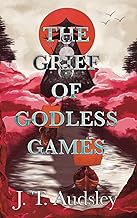
THE GRIEF OF GODLESS GAMES
by J.T. Audsley
Earth Island Books
(www.earthislandbooks.com)
2023, 425 pages, $17.19
ISBN 978-1-7394438-2-5
Click here to purchase

